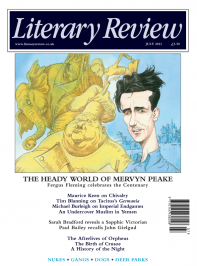Simon Akam
Letter From Sierra Leone
In St George’s Cathedral, a colonial relic just up from the waterfront in Sierra Leone’s sultry capital, Freetown, a series of plaques lines the walls of the nave. The panels record the untimely deaths of British administrators, sailors and soldiers, and serve as a telling reminder of the lethal nature of Sierra Leone’s muggy climate in an age before yellow fever vaccination and chemoprophylaxis for malaria.
But the old stones also preserve another phenomenon. The lives are commemorated in language that is distinctly Victorian. One, erected by the parents of a 21-year-old sailor who died in 1838, records ‘their untimely and irreparable loss from the effects of a season sickly beyond example in a

Sign Up to our newsletter
Receive free articles, highlights from the archive, news, details of prizes, and much more.@Lit_Review
Follow Literary Review on Twitter
Twitter Feed
It wasn’t until 1825 that Pepys’s diary became available for the first time. How it was eventually decrypted and published is a story of subterfuge and duplicity.
Kate Loveman tells the tale.
Kate Loveman - Publishing Pepys
Kate Loveman: Publishing Pepys
literaryreview.co.uk
Arthur Christopher Benson was a pillar of the Edwardian establishment. He was supremely well connected. As his newly published diaries reveal, he was also riotously indiscreet.
Piers Brendon compares Benson’s journals to others from the 20th century.
Piers Brendon - Land of Dopes & Tories
Piers Brendon: Land of Dopes & Tories - The Benson Diaries: Selections from the Diary of Arthur Christopher Benson by Eamon Duffy & Ronald Hyam (edd)
literaryreview.co.uk
Of the siblings Gwen and Augustus John, it is Augustus who has commanded most attention from collectors and connoisseurs.
Was he really the finer artist, asks Tanya Harrod, or is it time Gwen emerged from her brother’s shadow?
Tanya Harrod - Cut from the Same Canvas
Tanya Harrod: Cut from the Same Canvas - Artists, Siblings, Visionaries: The Lives and Loves of Gwen and Augustus John by Judith Mackrell
literaryreview.co.uk